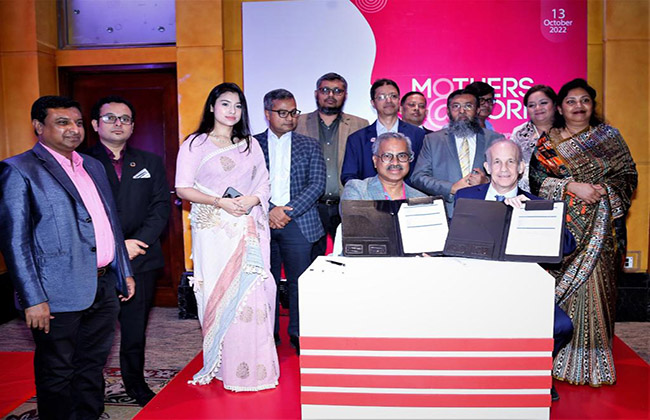
Unicef, the Bangladesh Garments’ Manufacturers and Exporters Association (BGMEA), and the Bangladesh Knitwear Manufacturers and Exporters Association (BKMEA) will support factories to provide breastfeeding spaces and breaks for mothers under the programme.
They will also assist factories in providing childcare facilities, paid maternity leave, cash benefits, healthcare, employment protection and a safe work environment for working mothers and pregnant women under the Unicef-led programme.
Evidence shows that paid time off, support for breastfeeding and antenatal services contribute to healthier children and happier families as well as gender equality, workforce productivity and sustainable economic growth, said Unicef.
Bangladesh’s garment industry is the second largest clothing exporter in the world, contributing about 11% to the country’s Gross Domestic Product. Over half of the nearly 40 lakh people working in garment factories are women of reproductive age. However, a 2018 Unicef survey revealed gaps in the provision of breaks and private spaces for breastfeeding, which is critical to children’s health and development.
Building on lessons learned from a Unicef pilot project, this partnership will improve working conditions for 130,000 women and provide better nutrition services and day-care facilities for 8,000 children. Beginning in 80 factories, the initiative will gradually aim to reach over 4,000 factories in Bangladesh, speculated Unicef.
Under the programme, a working mother will be able to take care of her child at the workplace during a 1,000-day window – starting from her pregnancy – which is critical for the baby’s growth.
Munira Parveen, nutrition officer of Unicef, said under the pilot project, two lakh female workers, including 6,657 pregnant women and lactating mothers and their 12,000 children aged below two, already enjoyed those facilities.
“Providing targeted support for women in the workforce and ensuring that women can earn a living, while also having the needed support to care for their children, is critical for women and their children and is an Investment that benefits all,” said Sheldon Yett, Unicef representative to Bangladesh.
“It is imperative to keep the workplace safe and welcoming for mothers and pregnant women working in garment factories to protect their well-being and ensure that their children receive key nutrients necessary to support a baby’s healthy development,” said Faruque Hassan, president of BGMEA.
“We are committed to building a conducive work environment for mothers in our knitwear sector, for the benefit of our workers, their children who are the future of our nation, and for our businesses,” said Fazlee Shamim Ehsan, vice president of BKMEA.
Unicef is also engaging with the government to sustain and scale up the Mothers@Work programme.
Unicef, the Bangladesh Garments’ Manufacturers and Exporters Association (BGMEA), and the Bangladesh Knitwear Manufacturers and Exporters Association (BKMEA) will support factories to provide breastfeeding spaces and breaks for mothers under the programme.
They will also assist factories in providing childcare facilities, paid maternity leave, cash benefits, healthcare, employment protection and a safe work environment for working mothers and pregnant women under the Unicef-led programme.
Evidence shows that paid time off, support for breastfeeding and antenatal services contribute to healthier children and happier families as well as gender equality, workforce productivity and sustainable economic growth, said Unicef.
Bangladesh’s garment industry is the second largest clothing exporter in the world, contributing about 11% to the country’s Gross Domestic Product. Over half of the nearly 40 lakh people working in garment factories are women of reproductive age. However, a 2018 Unicef survey revealed gaps in the provision of breaks and private spaces for breastfeeding, which is critical to children’s health and development.
Building on lessons learned from a Unicef pilot project, this partnership will improve working conditions for 130,000 women and provide better nutrition services and day-care facilities for 8,000 children. Beginning in 80 factories, the initiative will gradually aim to reach over 4,000 factories in Bangladesh, speculated Unicef.
Under the programme, a working mother will be able to take care of her child at the workplace during a 1,000-day window – starting from her pregnancy – which is critical for the baby’s growth.
Munira Parveen, nutrition officer of Unicef, said under the pilot project, two lakh female workers, including 6,657 pregnant women and lactating mothers and their 12,000 children aged below two, already enjoyed those facilities.
“Providing targeted support for women in the workforce and ensuring that women can earn a living, while also having the needed support to care for their children, is critical for women and their children and is an Investment that benefits all,” said Sheldon Yett, Unicef representative to Bangladesh.
“It is imperative to keep the workplace safe and welcoming for mothers and pregnant women working in garment factories to protect their well-being and ensure that their children receive key nutrients necessary to support a baby’s healthy development,” said Faruque Hassan, president of BGMEA.
“We are committed to building a conducive work environment for mothers in our knitwear sector, for the benefit of our workers, their children who are the future of our nation, and for our businesses,” said Fazlee Shamim Ehsan, vice president of BKMEA.
Unicef is also engaging with the government to sustain and scale up the Mothers@Work programme.

